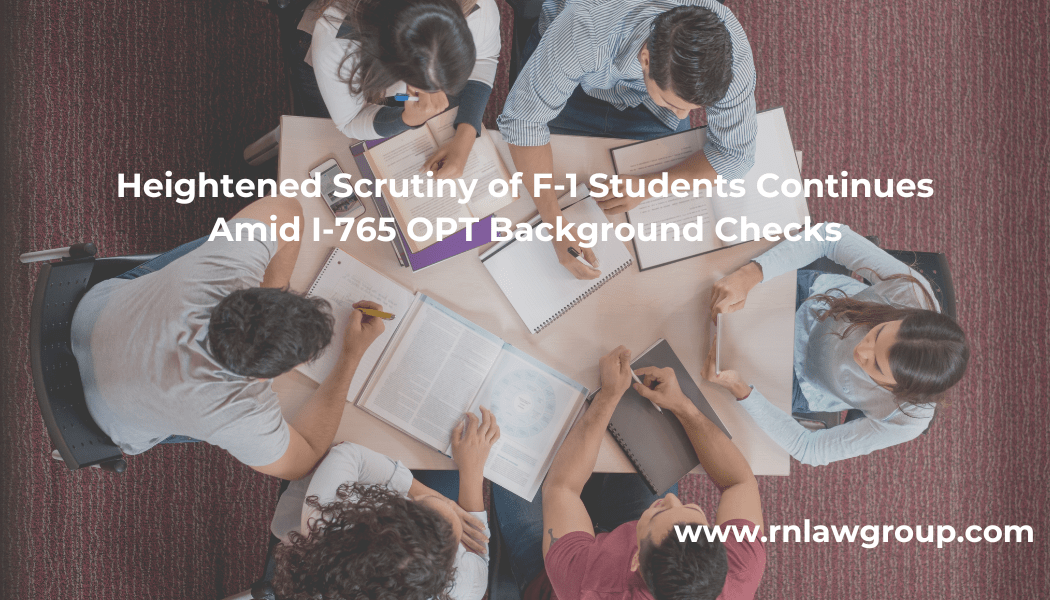
Heightened Scrutiny of F-1 Students Continues Amid I-765 OPT Background Checks
Background: SEVIS Terminations and Visa Revocations
In early 2025, a sweeping federal initiative led to the revocation of F-1 visas and termination of SEVIS records for thousands of international students in the United States. This program involved running over 1.3 million student names through a federal criminal database, resulting in approximately 6,400 matches. Many of these “hits” were for minor infractions, such as dismissed charges or traffic violations. Despite this, Immigration and Customs Enforcement (ICE) used the data to terminate student records in the SEVIS tracking system. The action triggered over 100 lawsuits and ultimately resulted in a reversal of many of the terminations after federal judges found the process lacked due process protections and failed to distinguish between serious criminal conduct and inconsequential or outdated offenses. The initiative, raised alarm among universities, immigration attorneys, and advocacy groups, who argued that the dragnet approach unfairly penalized students without notice or a meaningful opportunity to respond.
OPT RFEs for Arrest Records
Although ICE restored SEVIS records in many cases, the impact of the 2025 enforcement campaign is now surfacing in other contexts—most notably in I-765 Requests for Evidence (RFEs) issued during Optional Practical Training (OPT) applications. These RFEs often state that a background check has been conducted and disclose that the applicant was arrested or charged with a crime, regardless of whether the case was resolved or dismissed.
Applicants are requested to provide certified court disposition records for each incident, detailing the final outcome—such as dismissal, conviction, probation, or sentencing. If the case was expunged or sealed, applicants must still submit details of the arrest along with proof that the records are unavailable under the relevant jurisdiction’s law. If proceedings are pending, charging documents and the date of the next hearing must be included. Participation in any diversion or rehabilitative programs must also be documented. In addition to court records, USCIS typically requires a copy of the original arrest report, which must be obtained from the arresting law enforcement agency. If the report is not available, a formal certificate of non-existence on agency letterhead must be submitted. For convictions, applicants must include a copy of the criminal statute under which they were convicted and documentation of the sentence imposed.
Why USCIS Requests These Records
USCIS may be requesting these documents from F-1 students to evaluate whether any aspect of their criminal history affects their eligibility for Optional Practical Training (OPT). While an arrest or charge alone does not necessarily disqualify a student, USCIS must determine whether the applicant has maintained valid F-1 status and whether any past conduct might trigger inadmissibility or reflect behavior inconsistent with the purpose of the visa.
Importantly, students should be aware that these requests may also signal that USCIS is weighing whether to exercise its discretion to deny the application for employment authorization. Under 8 C.F.R. § 274a.13(a)(1), the approval of most applications for employment authorization, including those based on OPT, is explicitly stated to be within the discretion of USCIS. Although this discretionary authority is not typically cited in the text of the Request for Evidence (RFE), it remains a key factor in adjudication.
Discretionary Review: Weighing Positive and Negative Factors
According to Chapter 8 of the USCIS Policy Manual, officers must conduct a discretionary analysis when adjudicating certain benefits, taking into account both positive and negative factors. A criminal history—particularly if recent, unresolved, or serious—may weigh negatively in that analysis, though evidence of rehabilitation and reform may mitigate its impact.
Strengthening an OPT Application with Positive Evidence
When responding to a Request for Evidence (RFE) related to criminal history in an Optional Practical Training (OPT) application, F-1 students may want to consider strengthening their case by submitting documentation that highlights positive factors. According to the USCIS Policy Manual, officers conduct a discretionary analysis that weighs favorable and unfavorable factors in the totality of the circumstances. Positive factors that may influence a favorable exercise of discretion include:
- Academic Achievements: Evidence of strong academic performance, such as transcripts, awards, or honors, demonstrating the student’s commitment to their studies.
- Rehabilitation Efforts: Documentation of rehabilitation, including completion of counseling programs, community service, or other corrective measures taken following any criminal incidents.
- Community Involvement: Letters of recommendation or evidence of volunteer work and participation in community organizations, reflecting the student’s positive contributions to society.
- Employment Records: Proof of employment or internships, especially those related to the student’s field of study, indicating responsibility and integration into the community.
- Personal Statements: A detailed personal statement explaining the circumstances surrounding any criminal history, lessons learned, and steps taken to avoid future issues.
By providing comprehensive evidence of these positive factors, students can present a compelling case for the favorable exercise of discretion in their OPT application.
A Shift Toward Greater Enforcement
RFEs involving biometrics appointments and background checks have become more frequent in the wake of enhanced interagency data-sharing and background screening initiatives, reflecting an increased focus on vetting and enforcement even for nonimmigrants seeking routine immigration benefits. Care must be taken when responding to RFEs seeking criminal or arrest records in order to avoid a denial of the application or petition.
By: Emily Neumann
Emily Neumann is Managing Partner at Reddy Neumann Brown PC with over 15 years of experience practicing US immigration law providing services to U.S. businesses and multinational corporations. Emily has helped transform the firm from a solo practice to Houston’s largest immigration law firm focused exclusively on U.S. employment-based immigration. She received her Bachelor’s degree in Biology from Central Michigan University and her Juris Doctorate degree from the University of Houston Law Center. Emily is a frequent speaker and has been quoted in Bloomberg Law, U.S. News & World Report, Inside Higher Ed, and The Times of India on various hot topics in immigration. She is a member of the American Immigration Lawyers Association and Society for Human Resource Management.
Reddy & Neumann has been serving the business community for over 25 years and is Houston’s largest immigration law firm focused solely on US. Employment-based immigration. Reddy & Neumann is certified as a woman business enterprise by NWBOC. We work with both employers and their employees, helping them navigate the immigration process quickly and cost-effectively.

